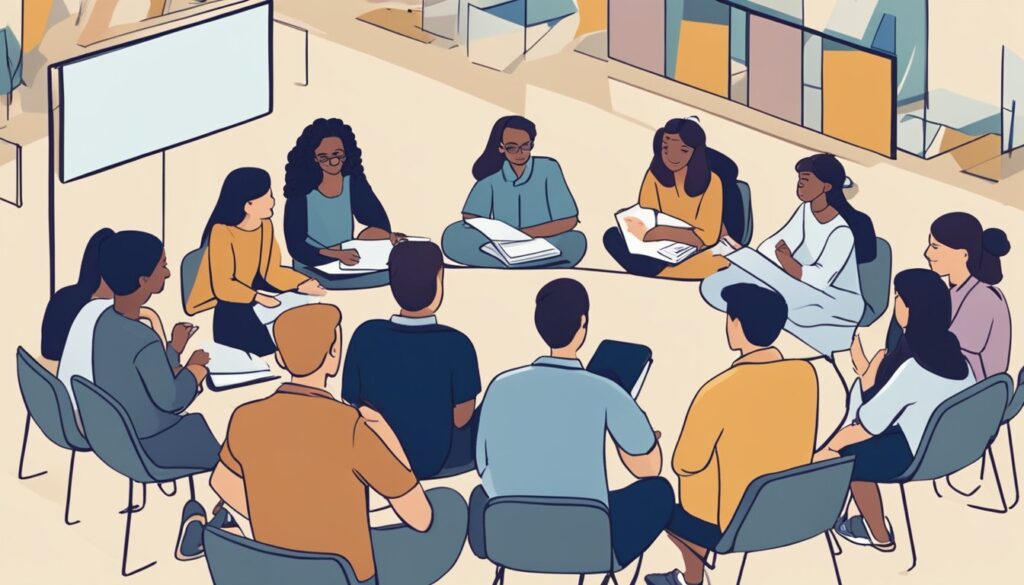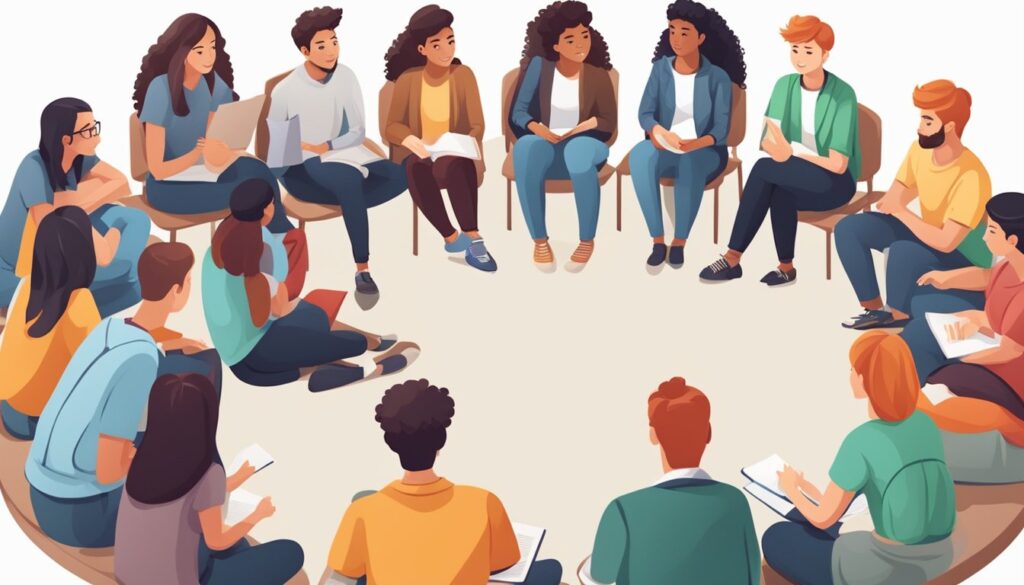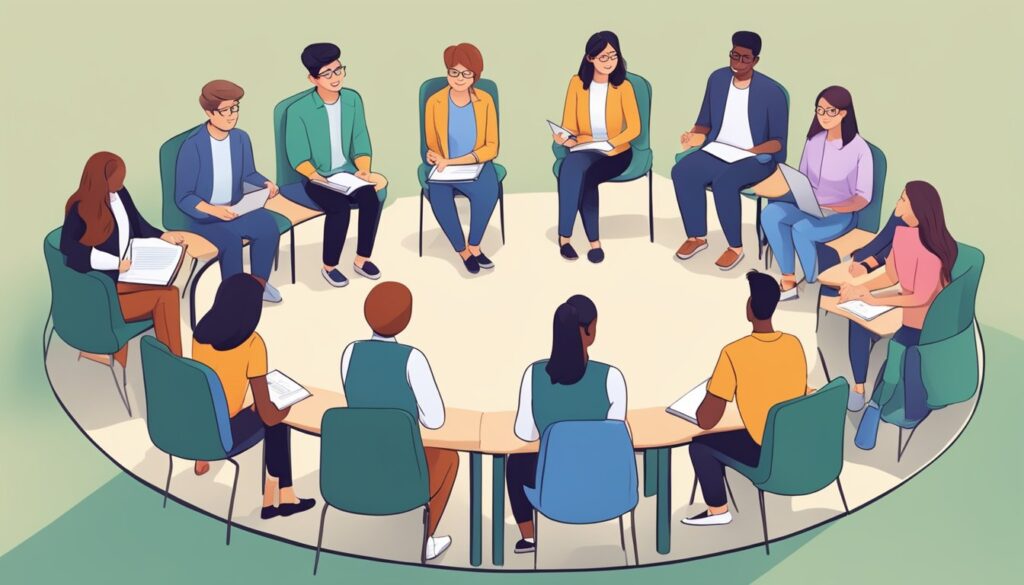100+ Interview Questions for College Students: Ace Your Campus Interviews

Interviews can be a pivotal step for college students as they transition from academia to the professional world. The questions posed during an interview are designed not only to assess a candidate’s qualifications but also to evaluate their problem-solving skills, communication abilities, and cultural fit within an organization.
In this Article, we will cover important Interview Questions for College students.
For students, understanding the types of questions they might face and how to approach them is essential for success.

Navigating through an interview effectively requires preparation and insight. It involves more than rehearsing answers; it also includes knowing how to convey experiences, education, and personal values in a way that resonates with potential employers.
College students should be ready to articulate their goals, strengths, and how their unique experiences have prepared them for the job market.
Crafting thoughtful, well-constructed responses can help college students stand out in a competitive field. This involves researching the company, understanding the role, and reflecting on past experiences that demonstrate relevant skills and achievements.
By preparing for common and industry-specific interview questions, students can approach interviews with the confidence and clarity needed to make a strong impression. Let’s have a look at the list of top 100 Questions for college students.
Page Contents
List of top 100 Questions for college students
- Tell me about yourself.
- Why did you choose your major?
- What are your strengths and weaknesses?
- Can you provide an example of a time when you demonstrated leadership skills?
- How do you handle stress and pressure?
- What are your career goals?
- Describe a challenging project or assignment you completed in college.
- How do you prioritize your tasks and manage your time effectively?
- What motivates you?
- How do you handle conflicts or disagreements with team members?
- Can you discuss a time when you had to adapt to a difficult situation?
- What do you know about the stream?
- Describe a situation where you had to work with a diverse group of people.
- How do you stay updated with industry trends and developments?
- What do you hope to gain from this position?
- Can you provide an example of a time when you had to meet a tight deadline?
- How do you handle receiving constructive criticism?
- What do you consider your most significant accomplishment in student life?
- Can you discuss a time when you had to work on a team project with conflicting personalities?
- How do you approach problem-solving and decision-making?
- Describe a time when you had to multitask and manage multiple responsibilities.
- What do you think sets you apart from other candidates?
- Can you discuss a time when you had to take initiative and lead a project?
- How do you handle failure or setbacks?
- What do you hope to contribute to the organization?
- Can you provide an example of a time when you had to persuade others to accept your viewpoint?
- How do you handle ambiguity and uncertainty?
- Describe a situation where you had to resolve a difficult situation with a friend.
- What do you consider the most important skills for success in this exam?
- Can you discuss a time when you had to learn a new skill or technology quickly?
- How do you stay organized and manage your workload effectively?
- Describe a time when you had to work with limited resources to achieve a goal.
- What do you think are the biggest challenges facing our industry today?
- Can you provide an example of a time when you had to navigate a complex problem or situation?
- How do you approach building and maintaining professional relationships?
- Can you discuss a time when you had to work on a project with a tight budget?
- How do you approach learning from your mistakes?
- Describe a situation where you had to work with a difficult team member.
- What do you think are the most important qualities for a successful team?
- Can you provide an example of a time when you had to communicate complex information to a non-technical audience?
- How do you stay motivated and maintain a positive attitude during challenging times?
- Describe a time when you had to go above and beyond to deliver exceptional results.
- What do you think are the most important ethical considerations in your field?
- Can you discuss a time when you had to manage conflicting priorities and deadlines?
- How do you approach building and maintaining a professional network?
- Describe a situation where you had to work with limited guidance or supervision.
- What do you think are the most important qualities for a successful leader?
- Can you provide an example of a time when you had to adapt to a rapidly changing situation or environment?
- How do you approach staying informed about current events and global issues?
- Describe a time when you had to convince others to adopt a new idea or approach.
- What do you think are the most important considerations when working in a team environment?
- Can you discuss a time when you had to work on a project with a tight deadline and limited resources?
- How do you approach staying adaptable and flexible in your work?
- Describe a situation where you had to work with individuals from different cultural backgrounds.
- What do you think are the most important skills for effective communication in the workplace?
- Can you provide an example of a time when you had to make a difficult decision with limited information?
- How do you approach seeking and incorporating feedback into your work?
- Describe a time when you had to work on a project that required a high level of creativity.
- What do you think are the most important considerations when working in a fast-paced environment?
- Can you discuss a time when you had to work on a project that required collaboration with multiple stakeholders?
- How do you approach building and maintaining trust in professional relationships?
- Describe a situation where you had to navigate a conflict between team members.
- Can you provide an example of a time when you had to manage a project with shifting priorities?
- How do you approach seeking out and learning from mentors in your field?
- Describe a time when you had to work on a project with limited direction or guidance.
- What do you think are the most important qualities for fostering a positive and inclusive work environment?
- Can you discuss a time when you had to manage competing demands from different stakeholders?
- How do you approach staying informed about industry trends and developments?
- Describe a situation where you had to work on a project that required cross-functional collaboration.
- What do you think are the most important considerations for working effectively in a remote or virtual environment?
- Can you provide an example of a time when you had to navigate a challenging negotiation or conflict resolution?
- How do you approach building and maintaining a strong personal brand in your field?
- Describe a time when you had to work on a project that required creative problem-solving.
- What do you think are the most important considerations for fostering innovation in the workplace?
- Can you discuss a time when you had to manage a project with rapidly changing requirements?
- How do you approach seeking out and incorporating diverse perspectives into your work?
- Describe a situation where you had to work with a team that had different communication styles.
- What do you think are the most important skills for effectively managing and leading a team?
- Can you provide an example of a time when you had to navigate a challenging ethical dilemma in your work?
- How do you approach building and maintaining resilience in the face of adversity?
- Describe a time when you had to work on a project that required cross-cultural sensitivity.
- What do you think are the most important considerations for fostering a culture of continuous learning in the workplace?
- Can you discuss a time when you had to manage a project that required balancing short-term and long-term goals?
- How do you approach seeking out and incorporating feedback from diverse sources?
- Describe a situation where you had to work with a team that had conflicting priorities.
- What do you think are the most important skills for navigating change and uncertainty in the workplace?
- Can you provide an example of a time when you had to navigate a difficult transition or change in your academic or professional life?
- Can you discuss a time when you had to work on a project that required you to learn a new skill or technology?
- How do you approach seeking out and incorporating feedback into your personal and professional development?
- Describe a situation where you had to manage a project that required you to adapt to evolving market trends.
- What do you think are the most important considerations for fostering a culture of diversity and inclusion in the workplace?
- Can you provide an example of a time when you had to navigate a challenging situation by leveraging your problem-solving skills?
- How do you approach seeking out and incorporating mentorship and coaching in your career development?
- Describe a time when you had to work on a project that required you to think outside the box and innovate.
- What do you think are the most important skills for successfully managing and leading a team through change and transformation?
- Can you discuss a time when you had to navigate a difficult decision that required you to balance competing interests?
- How do you approach building and maintaining a strong professional network to support your career growth and development?
- How do you manage your time when juggling multiple assignments and deadlines?
- Can you provide an example of how you dealt with constructive criticism?
- Tell us about a time you worked in a team?
General Interview Questions

When preparing for an interview, college students can expect to encounter a range of general questions. These are designed to explore their personality, strengths, and suitability for the role.
Below is a list of ten typical interview questions that students should be ready to answer:
- Can you tell us about yourself? This question allows the candidate to provide a personal narrative outlining their background, education, and interests.
- What are your strengths? Candidates should highlight personal attributes that align with job requirements.
- What are your weaknesses? A response should include a weakness and an explanation of proactive measures taken to address it.
- Why are you interested in this role? Candidates need to demonstrate genuine interest and how their skills match the role’s expectations.
- Where do you see yourself in five years? Students should articulate career aspirations and how the role fits into their long-term goals.
- Can you describe a challenge you’ve overcome? This question seeks insight into the candidate’s problem-solving abilities and resilience.
- How do you handle stress or pressure? A good answer would involve examples of stress-management strategies.
- What is your greatest accomplishment? Responses should reflect significant achievements relevant to the professional context.
- How do you work within a team? Sharing experiences of teamwork can show the candidate’s collaborative skills.
- Do you have any questions for us? This is an opportunity for candidates to show they have researched the company and are engaged in the conversation.
College students should craft responses that are concise yet informative, ensuring they convey their suitability for the job while allowing their personality to shine through.
Questions about Educational Background

When interviewing college students, it is important to assess their educational background to understand their academic experience and achievements.
Here are ten pertinent questions interviewers might ask:
- What is your major, and why did you choose it?
- The student typically selected their major based on interest, career goals, or aptitude in the subject area.
- Can you describe a particularly challenging course you’ve taken, and how you handled it?
- They often tackle difficult courses by seeking help, developing study groups, or dedicating extra time to the subject.
- What academic accomplishments are you most proud of?
- The student may refer to high GPA, scholarships, or special research projects.
- How have your college courses prepared you for this position?
- They might align their coursework with job requirements or highlight relevant skills they’ve developed.
- Did you complete any internships or cooperative education experiences? If so, what did you learn from them?
- Students who’ve done internships typically discuss the practical experience and professional skills they acquired.
- How do you manage your time when juggling multiple assignments and deadlines?
- They often employ time management techniques, prioritize tasks, and use tools like planners or digital apps to stay organized.
- What extracurricular activities did you engage in, and what have they taught you?
- These activities usually demonstrate time management, leadership, and teamwork skills.
- Have you worked on any significant academic projects or research? What was the outcome?
- They might discuss the projects’ scope, their role, and any findings or results.
- How do you stay motivated in your academic pursuits?
- Students generally stay motivated through goal-setting, self-discipline, or a passion for their field of study.
- What are your plans for continuing education or professional development?
- They may express intentions of graduate studies, certifications, or ongoing learning opportunities in their field.
Questions Based on Experience
When interviewing college students, employers often inquire about their experiences to gauge how they’ve applied their academic knowledge in practical settings.
Below is a list of questions focused on experience:
- Can you describe a project you worked on that you are particularly proud of?
They should explain the project’s objectives, their role, and the outcome, highlighting their skills and contributions. - What challenges did you face during your internship and how did you overcome them?
They should provide an example of a specific challenge and detail the steps they took to resolve it. - Have you had any leadership roles in college? If so, what did you learn from that experience?
They should mention any official or unofficial leadership positions and share key takeaways from those roles. - Tell us about a time you worked in a team. What was your role and how did the team achieve its goals?
They should focus on their ability to collaborate and support the team’s success, providing concrete instances. - Can you discuss an experience where you had to use your critical thinking skills to solve a problem?
They should describe the situation, the thought process, and the solution, emphasizing their analytical capabilities. - How have your academic experiences prepared you for the duties of this position?
They should connect their courses, projects or research with the job requirements, demonstrating relevance. - Describe a time when you had to manage multiple responsibilities simultaneously. How did you prioritize your tasks?
Their answer should provide insight into their time management and organizational skills. - Have you ever had to learn a new skill or software quickly for a class or project? How did you approach this?
They should highlight their adaptability and learning strategies pertinent to the requirement. - What experiences do you have with data analysis and how did those projects turn out?
They should detail experiences related to data, discussing any tools they used and the outcomes. - Can you provide an example of how you dealt with constructive criticism?
They should discuss the feedback they received, their reaction, and any subsequent improvements they made.
Technical Interview Questions

In preparing for technical interviews, college students should be ready to answer in-depth questions directly related to their area of study.
This includes both theory and practical knowledge, often involving problem-solving exercises.
Closing the Interview

In the final moments of an interview, a candidate has the opportunity to leave a lasting impression. They should ask insightful questions and understand thank-you note etiquette to effectively close the interaction.
Asking Insightful Questions
An interviewee should prepare a set of thoughtful questions that demonstrate their interest in the role and the organization. These queries may include:
- Advancement Opportunities: “Can you describe the potential career paths associated with this position?”
- Company Culture: “How would you characterize the work environment and the team I would be working with?”
- Expectations: “What are the immediate challenges that need to be addressed in this role?”
These questions should steer clear of topics like salary and benefits, which are more appropriate to address once an offer is extended.
Thank-You Note Etiquette
A prompt thank-you note can underscore an interviewee’s enthusiasm for the position. The message should be concise, personalized, and address the following elements:
- Expression of Gratitude: “Thank you for taking the time to discuss the [position title] with me.”
- Recap of Interest: Briefly reaffirm why you are a good fit for the role.
- Next Steps: Mention any follow-up items you discussed.
The thank-you note should ideally be sent within 24 hours of the interview, either via email or a handwritten message, depending on the company’s culture.
In conclusion, preparing for campus interviews is essential for college students, and having a wide range of potential questions at hand can significantly boost their confidence.
By familiarizing themselves with these 100+ interview questions, students can effectively showcase their skills, experiences, and readiness for the professional world, ultimately increasing their chances of acing campus interviews.







